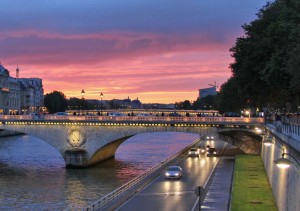It’s long been known as the City of Lights, but if current conditions continue, Paris might soon have to be renamed the City of Smog.
While much of the U.S. has been trapped in the deep freeze this winter, Europe has been unusually warm and that’s causing trouble with air quality. Paris, in particular, has been experiencing its worst air pollution in years and has taken some emergency measures to clear out the toxic haze that’s made it difficult to even see the beacon atop the Eiffel Tower.
The city barred nearly half of its vehicles from driving on Monday and is considering whether to extend that ban “depending on how the situation evolves,” according to a statement from the office of French Prime Minister Jean-Marc Ayrault.
France has had exceptionally warm, dry weather with little wind to blow away the smog that has been trapped over its capital city. Officials say the situation has been worsened by a mix of traffic in the city and seasonal farming activity in the surrounding countryside.
So, picking up on a strategy previously implemented in 1997, the city put in place an “alternating traffic” approach based on license plate numbers. The restrictions cover Paris and 22 surrounding suburbs. The restrictions exempted taxis and commercial vehicles, as well as electric vehicles.
(Despite new rules, increased pressure, are unsafe cars still avoiding recall? Click Here for the story.)
To make it easier on commuters and other residents, the city’s extensive public transport system was set to operate without charge.
“The Prime Minister is aware of the difficulties that this may cause to the everyday lives of Parisians,” the statement said. “But this is a necessary measure,” it added, referring to “significant risks to the health of residents.”
(Click Hereto see how a growing number of cities are considering going carless.)
Hundreds of police were assigned to man 179 regional checkpoints to enforce the ban and by midday Monday 4,000 motorists were ticketed, with 27 cars impounded when drivers refused to cooperate.
Paris is just the latest major city to take steps to limit vehicles, whether to deal with pollution or traffic problems.
Athens has used a similar alternate-day driving systems for a number of years that has been credited with reducing both smog and traffic congestion. Sao Paulo, Brazil has a more complex license number-based system that keeps each vehicle off the road one day a week.
In China, a growing number of cities that includes capital Beijing and economic center Shanghai have adopted rules limiting the number of new vehicles that can be registered each month. The country also is putting an emphasis on electric vehicles – which are generally exempt from the registration rules.
(California regulators studying rules for autonomous vehicles. Click Herefor more.)
London, meanwhile, has had a so-called congestion charge in place for more than a decade and a number of other cities have been considering a similar toll for those who want to enter central districts – though former New York City Mayor Michael Bloomberg was repeatedly blocked from implementing a congestion plan in the Big Apple.
Hamburg, Germany’s second-largest city, is weighing an even more radical plan that would ban vehicles entirely, phasing out traffic over a 20-year period.

